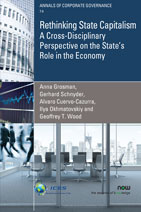Rethinking State Capitalism: A Cross-Disciplinary Perspective on the State’s Role in the Economy
By Anna Grosman, Loughborough University, UK, A.Grosman@lboro.ac.uk | Gerhard Schnyder, Loughborough University, UK, G.Schnyder@lboro.ac.uk | Alvaro Cuervo-Cazurra, Northeastern University, USA, A.CuervoCazurra@northeastern.edu | Ilya Okhmatovskiy, Nova School of Business and Economics, Portugal, ilya.okhmatovskiy@novasbe.pt | Geoffrey T. Wood, Western University, Canada, University of Bath and Cranfield University, UK, gwood23@uwo.ca
Abstract
We review the multidisciplinary literature on state capitalism and the firm to advance the theoretical foundations of the role of the government as an owner of firms. We explain state capitalism, how it has been theorized, how types of states affect choices within and between organizations, and the implications of government involvement on firm corporate governance structures and processes. Drawing on political economy, finance, and public administration literature, we clarify the alternative views of the role of government as an economic agent, the role of states in managing and preserving the natural world, and the tools of state capitalism in times of crisis. Based on our review, we identify four main venues for future research: investigating new types of state capitalism and their variety; studying the multilevel nature of state capitalism in a particular interaction between mechanisms of state capitalism at different levels (e.g., regulation and state-ownership); analyzing the contextuality of state capitalism; and examining similarities of state capitalism across countries.
Rethinking State Capitalism: A Cross-Disciplinary Perspective on the State’s Role in the Economy
Rethinking State Capitalism: A Cross-Disciplinary Perspective on the State’s Role in the Economy aims to foster cross-fertilization and thinking across social science disciplines about a new theory of the state in the economy. The authors review the state capitalism literature from various disciplines to shed light on the theorization of the state in socioeconomics by focusing on different themes. The study is structured into sections each presenting one perspective of the state in relation to the economy (history, political economy, finance, public administration, economics). The study sets out the state of the art regarding the theme in question and identifies blind spots and gaps in the respective research area, concluding with suggestions for future research directions.
